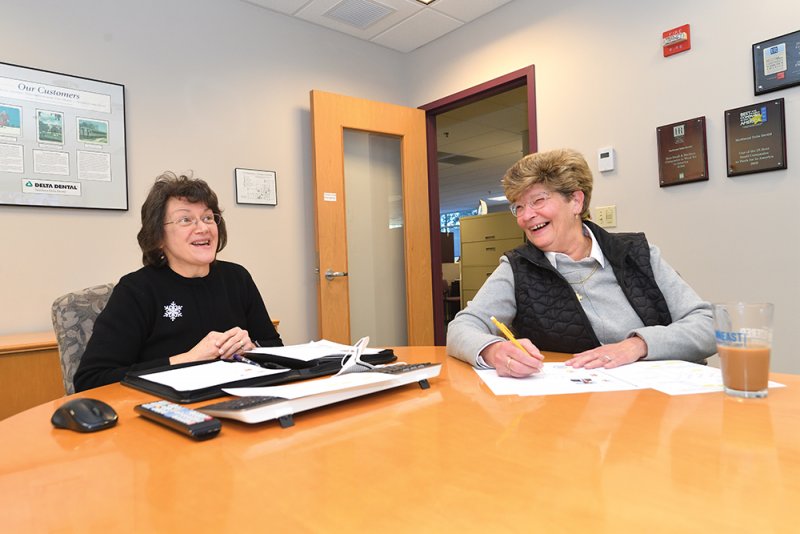
As the pandemic drags on, older workers are joining the great resignation by taking early retirement or starting encore careers and companies.
In November, Goldman Sachs researchers reported of the 5 million Americans who left the workforce since the start of the pandemic, 3.4 million are 55 or older, with 1.5 million taking early retirement and 1 million taking planned retirements. And the Goldman Sachs report notes most of those are not likely to return to work.
However, inflation and other economic forces may drive some mature workers back into the workforce, and employers facing a severe labor shortage are deploying strategies to not only hold on to experienced employees but attract others with deep experience. That means offering flexible work options and casting a wider recruitment net.
And NH companies need to be open minded about older workers considering the state’s demographics. New Hampshire consistently ranks among the top 10 states for having the largest share of its population age 65 or older and ranks second in the country for the oldest median age (43). That reality may be why several NH companies have signed the AARP Employer Pledge to promote equal opportunity for all workers regardless of age.
Todd Fahey, who at the time of this interview was in his final week as AARP state director having decided to return to law, says the pledge is a way for employers to say, “we look for older workers, we value what they can contribute and they are welcome here. We obviously have laws on the books against discrimination, but we are well-beyond that given the acute shortage.”
Fahey says a skilled manager or business leader must think outside the box when building a team. “It’s just like sports; some people are defenders, some are offense. Maybe someone isn’t a good leader but they’re great in goal,” says Fahey. “I hope we have the sophistication to make a place for these older workers because when you look at the numbers, that’s the population we have in New Hampshire.”
“You need all generations in the workforce,” says Tom Raffio, CEO of Northeast Delta Dental in Concord. “Everybody wants to be on the team, younger or more seasoned. About half of our team have been here more than a decade and 20% more than two decades. We have augmented with younger folks. It’s a great balance that has made us a juggernaut.”
Attracting Older Workers
Ryan King, vice president of HR at Northeast Delta Dental, says they have 235 employees and low turnover. “There is no magic wand. You’ve got to be creative. Check how your ads are written; you don’t want to be using terms like youthful and energetic, which could turn off the more senior jobseekers,” says King. “Don’t eliminate someone before your ad hits the street. Make sure it shows your inclusive culture.”

Northeast Delta Dental employees Cathy Frankel, manager, customer service, and Lis Anne Osgood, team leader, customer service. (Courtesy photo)
King recommends examining benefits, both how they are described in ads and what is offered. A 401(k) is more important to one generation than another. “You are selling the whole company, not just salary and benefits. You have to have all the pieces of the puzzle.”
Lee Schafer, senior vice president and chief human resources officer at Northeast Credit Union (NECU) in Portsmouth, says as a medium-sized employer of 350 to 400, hiring experienced workers is a business necessity. “We value experienced workers and are committed to diversity. As we have grown recently, we’ve charted a new strategy, hired a new CEO and need a more experienced workforce. We’re looking for folks who can come in and don’t need a lot of ramping up to begin to add value quickly,” he says.
Schafer says that over the past two years, NECU began adding to its management and senior leadership team. “These are roles that we have filled with more experienced workers. We need somebody who has been there and done that,” he says.
Traci Tenggren, NECU’s vice president of human resources, says experienced workers bring a set of soft skills and know how to communicate and build relationships. “We need them to mentor the less experienced folks, whether it’s a formal program or informal program. We find that it works really well having that diversity within the teams,” she says.
FedPoint, a third-party federal benefits administrator in Portsmouth, is looking to add to its workforce of more than 400 by actively recruiting senior workers. CEO Paul Forte says the work they do resonates with older workers.
“We have people of all ages; with an average of 48, that’s older than many local businesses. One reason for that may be that more mature individuals connect with the insurance benefits and financial services we manage,” says Forte. “Many of them have had to plan for their own families and deal with issues similar to those of the people they’re trying to help.”
Raffio agrees that a mission-driven job that helps people is a draw for mature workers. “Once people figure out this isn’t boring insurance, rather that it’s a belief that everybody deserves a smile, they are attracted to the work,” he says. “By us serving our customers, getting them to the dentist and attracting smaller employers to offer a dental benefit, we are actually doing mitzvah for society.”
Tenggren says when they’re interviewing, they’re looking for people who enjoy what they do. “They want to do it here because of our purpose-driven mission. Their experience outside has value as well. People come with all kinds of ideas, and we love to hear their ideas,” she says.
Casting a Wider Net
Networking is a great tool for jobseekers but also for HR recruiters. Companies are now taking advantage of board
connections, chambers and volunteer organizations to reach new and different populations. “Because we have been very active in charitable giving for many years, we are able to spread the word through our staff who are engaged in volunteer and board service,” says Forte, noting that is in addition to using conventional methods to advertise positions, including social media, newspapers and LinkedIn.
King of Northeast Delta Dental agrees it takes a multi-pronged approach to reach various job seekers. “It’s not the old days, you just threw an ad in the newspaper. Now you need social media, LinkedIn, Indeed, Craigslist and placement agencies. People are using agents because they do all the work for you,” he says.
And just as jobseekers need to be mindful of their online presence and reputation, companies must do the same, says King. “People really look at reputation and company culture and take stock in reviews on sites like Glassdoor,” he says.
Amy Cann, managing partner at HR ROI Consulting in Portsmouth, says offering flextime and part-time options is a way to attract retirees. “Many people retire and find out they miss working, but they don’t want to do 40-plus hours anymore,” she says. Cann adds that while some may be overqualified for less senior positions, they don’t necessarily want that kind of career anymore with all of the hours and stress it brings and would be a good fit in a different or junior position.
Cann adds that employers should be open-minded about what everyone brings to the table. Don’t overlook experience, patience and a strong work ethic, and don’t make assumptions of mental or physical ability or tech skills, she says. Interview everyone using the same questions, testing and pre-employments.
Fahey agrees, adding many experienced workers are tech savvy. “It’s just a convenient myth,” he says, adding for people over 50, tech was far more challenging in its early days than it is today. “You had to have a more intimate knowledge of computers; there weren’t all these apps. People understood the interplay between hardware and software,” says Fahey. “It’s ageist to assume people don’t have the hard skills. We also have data that shows people like to learn new skills.”
Retaining Senior Workers
Companies need to hold onto their senior talent as well. Older workers may be more motivated by a sense of purpose or accomplishment than by benefits and pay. They may also be more interested in the connections they make, which is a challenge when so much is still remote.
At FedPoint, Forte says they avoid burnout by offering many tracks and different job types to maintain engagement. “The flexibility helps, and we offer some benefits starting at 24 hours a week, including a 6% 401(k) match. All employees get all the federal holidays,” he says. The company also offers more flexibility. Staff are now only expected to work onsite two days while managers and supervisors are required to work onsite three days a week.
At Northeast Delta Dental—a company recognized for its teambuilding activities—holiday celebrations, Halloween parades and trivia moved into the virtual realm. That was critical to maintaining that culture, says King.
They also created a Virtual Water Cooler where topics range from sports to music and culture to vacations. “We’ve all gotten used to Zoom and WebEx, and the Watercooler talks are a way of making sure we don’t lose connectivity,” says King.
Having experienced managers can also be critical to reducing turnover overall. “We’ve discovered two drivers to that turnover: one is the level of employee engagement and the other is the manager,” says Schafer of NECU. “So, it’s critical for us to get the right managers in place. That’s another reason why we’re so interested in having experienced workers because they bring that to the table.”
At the end of the day, creating a workplace that is welcoming of all is just the right thing to do. “There is nobility in work,” says Fahey. “It’s about manifesting yourself in the world regardless of your age, regardless of whether you’ve had a criminal conviction, or you’re an immigrant or you’re in the LGBTQ community or you’re a person of color. We have got to give people that opportunity. We talk so much about fairness and justice and equity. Do we do: walk that walk? Do we do: we welcome those people? I hope so for the sake of the state and given where we are with the population of our workforce.”

 Current Issue - April 2024
Current Issue - April 2024